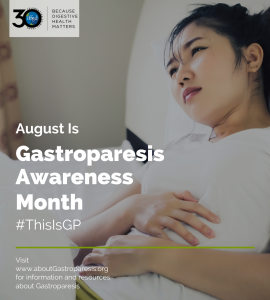In Honor of National Gastroparesis Awareness Month
Hon. Gwen Moore
of Wisconsin
in the House of Representatives
Thursday, July 9, 2015
Ms. MOORE. Mr. Speaker, I rise today on behalf of Americans affected by gastroparesis, also known as delayed gastric emptying, in observance of National Gastroparesis Awareness Month in August.
Gastroparesis is a chronic medical condition where the stomach cannot empty properly in the absence of any observable blockage. Factors causing gastroparesis may include long-standing diabetes, complications from surgeries, or other illnesses, such as MS and Parkinson’s disease.
Gastroparesis is relatively common, affecting an estimated 5 million Americans including thousands in my district in Milwaukee. While it can strike anyone at any age, gastroparesis is four times more likely to affect women than men.
Gastroparesis can be debilitating and sometimes life threatening. Symptoms (including nausea or vomiting, stomach fullness, inability to finish a meal, and others) usually occur during and after eating a normal sized meal and can result in problems, such as severe dehydration, difficulty managing blood glucose levels, obstruction, and malnutrition.
There is no cure for gastroparesis. Treatments like dietary measures, medications, procedures to maintain nutrition, and surgery can only reduce symptoms and related problems with the hope of maintaining quality of life.
Studies reveal a growing incidence of gastroparesis, as well as increasing rates of related hospitalizations and emergency room visits. However, as gastroparesis is a poorly understood condition, delayed diagnosis, treatment, and management of the condition are frequent challenges faced by this patient population.
Gastroparesis creates a significant burden on individuals and families. It also places a burden of direct and indirect costs on the community, economy, and U.S. healthcare system.
I applaud the efforts of nonprofit groups like the International Foundation for Functional Gastrointestinal Disorders (IFFGD) from Milwaukee, as well as other patient organizations, to provide education and support that will help those affected by gastroparesis.
I urge my fellow colleagues to join me in recognizing August as National Gastroparesis Awareness Month in an effort to improve our understanding and awareness of this condition, as well as support increased research for effective treatments of people affected by gastroparesis.

Congressional Record
Proceedings and Debates of the US Congress










